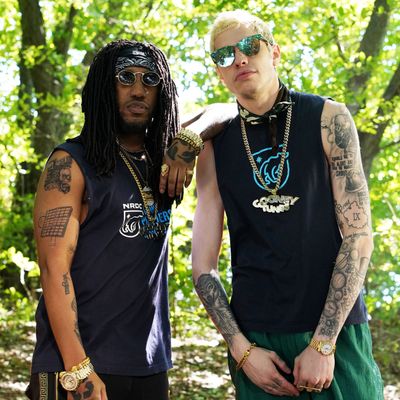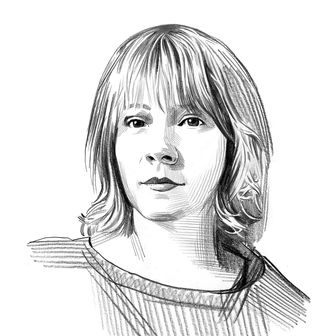
Chris Redd and Pete Davidson’s hip-hop ode to trees did not play in its entirety during SNL’s live airing. But many people digest the show over the week, sketch-by-sketch. Redd wrote “Trees” to have staying power, because the message of enthusiastic but ill-informed environmentalism is important.
In the video, Redd and Davidson (and a mute thug with a recycling symbol neck tattoo) kidnap Beck Bennett to teach him about the very real dangers of climate change. At the end, Al Gore blooms out of a daisy and gives the gang a thumbs-up. Gore actually recorded the footage himself at the request of his buddy Pete Davidson. How does Pete Davidson know Al Gore? Unclear.
Redd has used music to address other serious issues on the show: “Friendos” looked at the real work that goes into sustaining adult friendships, and Emmy-winning “Come Back Barack” gave voice to the country’s yearning for a sane leader. He spoke with Vulture about how to sneak issues into music, and why all rap is character work.
How has the response been, now that people have seen the entire sketch?
Now that I know they’ve seen the sketch. I didn’t even know at first [that it got interrupted], because in the studio they played the whole thing. We thought everybody saw it. But it’s been good. There have been a lot of tree organizations that have been tweeting it. And Al Gore tweeted it, which was really fun. People have been loving it. I didn’t realize so many people loved trees.
How long have you loved trees?
My whole life, Bethy! My whole life I’ve loved trees! I’m really big on the Earth and the health of it. My grandma was somebody who had a garden and grew plants all the time. It’s not like I’m a part of 1,000 organizations, I’m not going to lie like that, but it’s something I’ve been conscious of for a long time. With climate change, we’re seeing these reports about what we need to do to keep the Earth healthy. We’ve got to do something to make people think about it a little more, even if we have to be dumb in the sketch to do it.
Tell me about the process of writing a rap for comedy. How does that work?
It’s similar to how I used to write regular rap, only this is more successful, because I’m embracing the comedy of it. What I usually like to do is find beats that will speak to me a little bit that make me think I can write something to it — I like what the beat feels like, what the vibe is. Then it’s finding the words that you want to say, and writing those first. Then you figure out what style to bring to those words to make them fit. What’s most interesting to me is people love the verse where I talk about planting the tree. But none of those words rhyme, at all. Not one. There’s no rhyming in there. But it’s the style that makes it seem like it’s rhyming. People are like “That’s crazy!” It’s crazy that y’all think it’s rhyming, because it’s not. But that’s what’s fun about comedy. You have room to not have to be perfect.
Some comedic rappers like to sound silly or goofy. I like to make it sound as much like real rap as possible, and have silly little things about it. That’s where the comedy lives — the visuals and not rhyming, or talking about something over and over. [It’s] where the perspective comes from, and not a silly voice over a beat. Even though I like that, too.
There’s totally room for both. Where did the beat come from?
This guy Johnny Juliano made the beat. He is a producer that I had found randomly online years ago, when I first started writing raps. I have another beat by him that I’ll try to get on the show later this year. [Him and] this other guy, SuperStar O, were like the dream team producing squad. Johnny was really consistent about hard-hitting beats with sounds you wouldn’t think to put in a hip-hop record, which I always like. He did a couple of Wiz Khalifa’s early mixtape stuff. When I sent my stuff to him back then, he didn’t really respond. And then, years later, I’m thinking about how I want to do this song about trees. It had been ten years. And then I found that beat and recorded a real rough [demo] of it with Pete and sent it back to him. He was like, “Is this the real Chris Redd?” I was like, “Yeah! I’ve been buying beats off you for years!” And he was like, “Oh, for real? Now I know.” I had been a fan of his for a long time, and by the time I reached out for this song, he was a fan of me. It just became a very cool relationship.
Where did you get the Al Gore thumbs-up footage?
Al Gore sent that to us. He personally sent that to us, and we have other footage of him doing weird climate quotes and stuff. Pete has this, um … Pete … Pete’s very plugged in to people, man. He knows a lot of people at weird levels. Certain people make sense, but then it’s like, “I know Al Gore.” He reached out to see if he could send a video over the summer. We were all like, “Pete, how do you know Al Gore?”
Wait, what? How … did Pete tell you how he knew Al Gore?
Pete would have to tell you the story, I don’t really remember it. I didn’t even believe him until we got the video. That’s just how the universe works sometimes, man. Sometimes Pete knows Al Gore. Sometimes it snows in summertime. I didn’t even get too deep into it. I think they did some event together, some logical thing. But for me, I like the mystery. Some things you don’t want to know.
How is it different to be writing and performing a sketch versus just facilitating someone else’s words? As a cast member who also writes, how are those two things different?
It was my dream to rap. So when I make a rap song that works, and I wrote it, it feels like all of the things I worked for are coming to fruition. Everyone can see my idea, and I have more ownership over it. There’s a joy about other people’s words, too. It’s the difference between hanging out with your kid and hanging out with your nephew, you know what I mean? There’s still love, but I love my kid a little more because it’s my kid. There’s more ownership in it, and you see your words working. It’s the same when it doesn’t work. That hurts more because it’s my words, it’s my fault.
The difference between your kid going to jail and your nephew going to jail.
[Laughs.] Exactly! You know what, I love my nephew, and I’m going to be there for him, but hey. Ain’t my kid. I did what I could.
In the video you say you like doing character work. What do you specifically like about it?
I like getting lost in the character and figuring out what that character wants and needs. I love doing voices. I’ve been a people-watcher my whole life, and so I picked up all these different character mannerisms. Growing up, my family was very wild. Outlandish. I don’t really have to go far to channel people. I just like to play in that world, where you can figure out everything. Question everything, and be silly. Be hard, but love something soft. I just like playing opposites. I have a wild imagination, and this seems like the best way to get it out.
How is it different writing rap for a character versus something that is supposed to be coming from you?
For me, rap is always kind of in-character. For some people it’s a lighter veil, and others are a complete character. A lighter veil would be Common, but a complete character to me is Eminem. And I love both of those artists. But writing a character, there’s a ton more freedom in that. You can do anything, say anything, go anywhere, and it’s all in that character. It doesn’t have to really be coming from you. When it’s coming from you, people have to know your perspective, have to know where you’re come from. They have to know when you’re joking, if you’re serious. I think I like the freedom of writing for a character, because you can go more places. I like saying crazier things, and characters are a good way to hide.
That’s interesting because climate change isn’t crazy. What benefit did you find in using a character to talk about something so real as the fact that there might not be an inhabitable planet in 20 years?
Rap makes a certain demographic of people listen to something and actually care about it a little bit more. I’m not done talking about it. That character, the gangster environmentalist, is a character I like to do a lot. I think a good way to get people to continue thinking about [climate change] is music. Music hangs with you a long time — way longer than a joke most of the time. We put that [report] in it pretty immediately, because that happened, too. While we’re all talking about what Taylor Swift thinks and all these other things are going on, like, yo: They did say we could lose our Earth in about 12 years, and we need to talk about that. The only clear information in the song is Alex’s part when he’s the doctor, running down these very real things you need to do. And then as we continue to talk about these things, find other ways to talk about these issues, we can have that. But I feel like music is always a way to sneak some good information into people’s ears, even if they don’t want to hear it. Because you have a lot of people that don’t believe it, but love rap. The more they listen to it, the more they think about it, and maybe look some stuff up. At least that’s what I do.
Socially conscious hip-hop kind of goes through phases of popularity. Would you say it’s on the way back up?
Yeah, I think so — with the likes of Kendrick Lamar, people that are making it cool. Kendrick is cool, but he’s also saying very, very real things all the time. J. Cole and him, these are some of the biggest artists out and they’re very conscious of what’s going on in the streets, what’s going on with the world, the government. They’re talking about this stuff; they’re not shying away from it. But then you have a whole subsection of music: of Migos and the Lil Yachties, so many other people that don’t talk about that at all. I think you need both things. And so I’m in my lane, comedy, where I can bounce around between those two things and throw stuff in there. Not every song is going to be a ballad or ode to something real, but I think that there’s a way to do it. I like to be socially conscious, so I think there’s a way to do it and have fun with these important issues.


